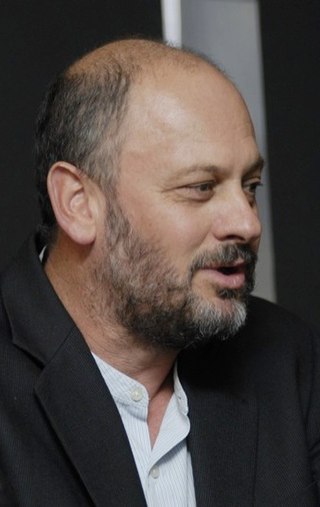
Timothy Fridtjof Flannery is an Australian mammalogist, palaeontologist, environmentalist, conservationist, explorer, author, science communicator, activist and public scientist. He was awarded Australian of the Year in 2007 for his work and advocacy on environmental issues. He is the Geneva Graduate Institute’s Fondation Segré Distinguished Visiting Professor.
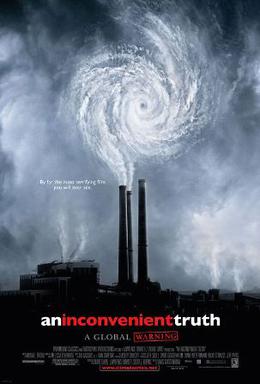
An Inconvenient Truth is a 2006 American documentary film directed by Davis Guggenheim about former vice president of the United States Al Gore's campaign to educate people about global warming. The film features a slide show that, by Gore's own estimate, he has presented over 1,000 times to audiences worldwide.

Are We Changing Planet Earth? and Can We Save Planet Earth? are two programmes that form a documentary about global warming, presented by David Attenborough. They were first broadcast in the United Kingdom on 24 May and 1 June 2006 respectively.
The Stern Review on the Economics of Climate Change is a 700-page report released for the Government of the United Kingdom on 30 October 2006 by economist Nicholas Stern, chair of the Grantham Research Institute on Climate Change and the Environment at the London School of Economics (LSE) and also chair of the Centre for Climate Change Economics and Policy (CCCEP) at Leeds University and LSE. The report discusses the effect of global warming on the world economy. Although not the first economic report on climate change, it is significant as the largest and most widely known and discussed report of its kind.

Hell and High Water: Global Warming – the Solution and the Politics – and What We Should Do is a book by author, scientist, and former U.S. Department of Energy official Joseph J. Romm, published December 26, 2006. The author is "one of the world's leading experts on clean energy, advanced vehicles, energy security, and greenhouse gas mitigation."
The Lavoisier Group is an Australian organisation formed by politicians and dominated by retired industrial businesspeople and engineers. It does not accept the science of global warming and works to influence attitudes of policy makers and politicians. The organisation downplays the risk of the effects of global warming, rejects the scientific conclusion that human activity causes it, and opposes policies designed to curtail it. Some members regard climate change as a "scam."

References to climate change in popular culture have existed since the late 20th century and increased in the 21st century. Climate change, its impacts, and related human-environment interactions have been featured in nonfiction books and documentaries, but also literature, film, music, television shows and video games.

The Great Global Warming Swindle is a 2007 British polemical documentary film directed by Martin Durkin. The film denies the scientific consensus about the reality and causes of climate change, justifying this by suggesting that climatology is influenced by funding and political factors. The program was formally criticised by Ofcom, the UK broadcasting regulatory agency, which ruled the film failed to uphold due impartiality and upheld complaints of misrepresentation made by David King, who appeared in the film.

Scorcher: The Dirty Politics of Climate Change is a 2007 book by Clive Hamilton which contends that Australia rather than the United States is the major stumbling block to a more effective Kyoto Protocol. In the final chapter of the book Hamilton argues that "the Howard government has been actively working to destroy the Kyoto Protocol".

The 11th Hour is a 2007 documentary film on the state of the natural environment created, produced, co-written and narrated by Leonardo DiCaprio. It was directed by Leila Conners Petersen and Nadia Conners and financed by Adam Lewis and Pierre André Senizergues, and distributed by Warner Independent Pictures.
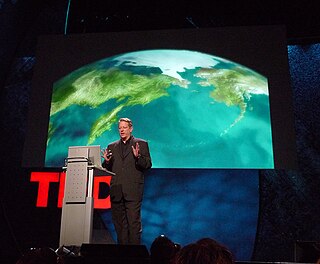
Al Gore is an American politician and environmentalist. He was vice president of the United States from 1993 to 2001, the Democratic Party's presidential nominee in 2000, and the co-recipient of the 2007 Nobel Peace Prize with the Intergovernmental Panel on Climate Change. He has been involved with the environmental activist movement for a number of decades and has had full participation since he left the vice-presidency in 2001.
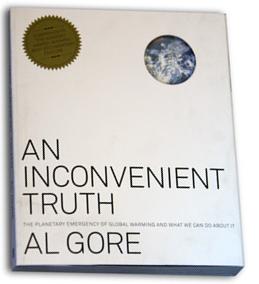
An Inconvenient Truth: The Planetary Emergency of Global Warming and What We Can Do About It is a 2006 book by Al Gore released in conjunction with the film An Inconvenient Truth. It is published by Rodale Press in Emmaus, Pennsylvania, in the United States.
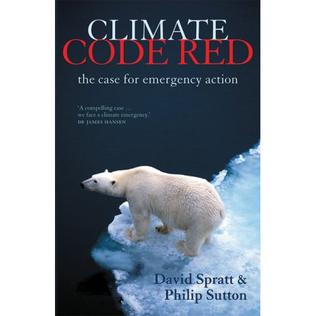
Climate Code Red: The Case for Emergency Action is a 2008 book which presents scientific evidence that the global warming crisis is worse than official reports and national governments have so far indicated. The book argues humanity is facing a sustainability emergency that requires a clear break from business-as-usual politics. The authors explain that emergency action to address climate change is not so much a radical idea as an indispensable course to embark upon. It draws heavily on the work of many climate scientists, including James E. Hansen.

The Lazarus Project is a 2008 novel by Bosnian fiction writer and journalist Aleksandar Hemon. It features the true story of the death of Lazarus Averbuch, a teenaged Jewish immigrant to Chicago who was shot and killed by a police officer in 1908. It was a finalist for the 2008 National Book Award and National Book Critics Circle Award, as well as, the winner of the inaugural Jan Michalski Prize for Literature in 2010.
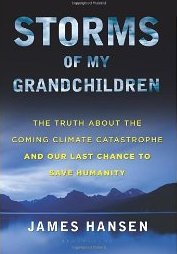
Storms of My Grandchildren: The Truth About the Coming Climate Catastrophe and Our Last Chance to Save Humanity is climate scientist James Hansen's first book, published by Bloomsbury Press in 2009. The book is about threats to people and habitability for life on earth from global warming.
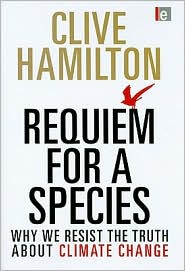
Requiem for a Species: Why We Resist the Truth about Climate Change is a 2010 non-fiction book by Australian academic Clive Hamilton which explores climate change denial and its implications. It argues that climate change will bring about large-scale, harmful consequences for habitability for life on Earth including humans, which it is too late to prevent. Hamilton explores why politicians, corporations and the public deny or refuse to act on this reality. He invokes a variety of explanations, including wishful thinking, ideology, consumer culture and active lobbying by the fossil fuel industry. The book builds on the author's fifteen-year prior history of writing about these subjects, with previous books including Growth Fetish and Scorcher: The Dirty Politics of Climate Change.
Timothy Francis Ball was a British-born Canadian public speaker and writer who was a professor in the Department of Geography at the University of Winnipeg from 1971 until his retirement in 1996. Subsequently Ball became active in promoting rejection of the scientific consensus on global warming, giving public talks and writing opinion pieces and letters to the editor for Canadian newspapers.
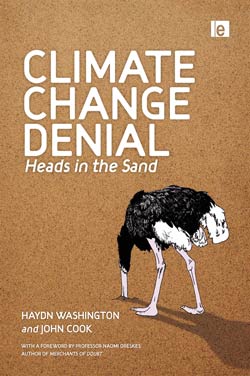
Climate Change Denial: Heads in the Sand is a 2011 non-fiction book about climate-change denial, coauthored by Haydn Washington and John Cook, with a foreword by Naomi Oreskes. Washington had a background in environmental science prior to authoring the work; Cook, educated in physics, founded (2007) the website Skeptical Science, which compiles peer-reviewed evidence of global warming. The book was first published in hardcover and paperback formats in 2011 by Earthscan, a division of Routledge.

The Uninhabitable Earth: Life After Warming is a 2019 non-fiction book by David Wallace-Wells about the consequences of global warming. It was inspired by his New York magazine article "The Uninhabitable Earth" (2017).
















